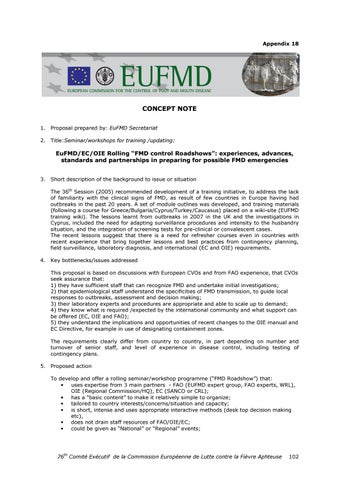Appendix 18
CONCEPT NOTE 1.
Proposal prepared by: EuFMD Secretariat
2.
Title:Seminar/workshops for training /updating:
EuFMD/EC/OIE Rolling “FMD control Roadshows”: experiences, advances, standards and partnerships in preparing for possible FMD emergencies 3.
Short description of the background to issue or situation The 36th Session (2005) recommended development of a training initiative, to address the lack of familiarity with the clinical signs of FMD, as result of few countries in Europe having had outbreaks in the past 20 years. A set of module outlines was developed, and training materials (following a course for Greece/Bulgaria/Cyprus/Turkey/Caucasus) placed on a wiki-site (EUFMD training wiki). The lessons learnt from outbreaks in 2007 in the UK and the investigations in Cyprus, included the need for adapting surveillance procedures and intensity to the husbandry situation, and the integration of screening tests for pre-clinical or convalescent cases. The recent lessons suggest that there is a need for refresher courses even in countries with recent experience that bring together lessons and best practices from contingency planning, field surveillance, laboratory diagnosis, and international (EC and OIE) requirements.
4.
Key bottlenecks/issues addressed This proposal is based on discussions with European CVOs and from FAO experience, that CVOs seek assurance that: 1) they have sufficient staff that can recognize FMD and undertake initial investigations; 2) that epidemiological staff understand the specificities of FMD transmission, to guide local responses to outbreaks, assessment and decision making; 3) their laboratory experts and procedures are appropriate and able to scale up to demand; 4) they know what is required /expected by the international community and what support can be offered (EC, OIE and FAO); 5) they understand the implications and opportunities of recent changes to the OIE manual and EC Directive, for example in use of designating containment zones. The requirements clearly differ from country to country, in part depending on number and turnover of senior staff, and level of experience in disease control, including testing of contingency plans.
5.
Proposed action To develop and offer a rolling seminar/workshop programme (“FMD Roadshow”) that: • uses expertise from 3 main partners - FAO (EUFMD expert group, FAO experts, WRL), OIE (Regional Commission/HQ), EC (SANCO or CRL); • has a “basic content” to make it relatively simple to organize; • tailored to country interests/concerns/situation and capacity; • is short, intense and uses appropriate interactive methods (desk top decision making etc), • does not drain staff resources of FAO/OIE/EC; • could be given as “National” or “Regional” events;
76th Comité Exécutif de la Commission Européenne de Lutte contre la Fièvre Aphteuse
102




